Letter to the Editor | Reporting on sexual violence, part I
Transforming visibility into intentional activism
Content Warning: this article discusses themes of sexual violence in detail. It also discusses racism, homophobia, and other forms of oppression linked to sexual violence in broad terms.

As members of the Sexual Violence Prevention and Response collective — SVPR — we have concerns surrounding student reporting. The findings of the 2022 Sexual Misconduct Climate Survey released this past Tuesday affirmed the importance of a campuswide commitment to combatting sexual violence with a trauma-informed approach. To this end, we seek to highlight harmful trends in student reporting surrounding sexual violence at Tulane to move towards an informed understanding of how sexual violence functions. In a second article to be released this Wednesday, we offer our potential solutions for student reporters and our community to consider.
Sexual violence is power-based violence. It occurs outside of the typical roles our world casts survivors and abusers into. Instead, sexual violence can be best understood by the power that abusers seek to hold over survivors no matter their identity. The power structures that enable other types of oppression thus enable sexual violence. Understanding this foundation is key to an intersectional approach to prevention and response.
Several Tulane organizations focus exclusively on sexual violence prevention and response, but individual organizations — like The Hullabaloo — must report on sexual violence with an understanding of power-based violence. Part of this responsibility is to include appropriate content warnings in potentially triggering material. Content warnings allow survivors and readers the opportunity to activate coping mechanisms before engaging with triggering material, or allow them to avoid it altogether. Reporting outlets must provide survivors with choice, something that has been taken from them before.
The Hullabaloo often fails to include adequate content warnings in pieces discussing sexual violence. Only a few of the articles appearing under “sexual assault” or related tags on the Hullabaloo website have a content warning. The most recent example is the article “Sigma Alpha Epsilon Faces Sexual Assault Allegation,” which extensively discusses acts of sexual violence and themes surrounding it without a content warning. Furthermore, content warnings that are included are typically vague. It is important for content warnings to address the type of sexual violence and the extent to which it will be discussed. See our content guide for more extensive explanations.
Further, a large portion of Hullabaloo articles rely on a harmful undertone that suggests sexual violence is exclusively perpetrated by straight cisgender men and victimizes straight cisgender women. Straight women do experience sexual violence in overwhelming numbers, and these voices deserve to be heard. That said, LGBTQ+ women are statistically the most affected by sexual violence on our campus according to the 2022 climate survey. BIPOC survivors were likely underrepresented in this sample and experience sexual violence at disproportionate rates. Male survivors were also likely underrepresented and similarly are underrepresented in national statistics. Our collective sees this issue most prevalently in The Hullabaloo’s choice to cover flash-point events rather than the institutional efforts of those organizing around sexual violence on our campus every day. Because these spurts of activism are often more spontaneous, historically marginalized groups are largely left out of the conversation when intentional efforts are not being made to have their voices included.
Our collective also takes issue with information gaps in Hullabaloo articles about sexual violence. We understand there is a mountain of information to sift through concerning this issue. We also grapple with it every day. However, it is important that every detail surrounding sexual violence be presented intentionally so as to educate newcomers just starting to get passionate about prevention and response. Each time we as activists put a resource into the world, we vouch for its credibility and create a foundation of knowledge for others. Let’s commit to making that foundation a strong one.
Most recently, we saw these gaps in the article “OPINION | Frequent Crime Alerts Create Sexual Assault Desensitization.” This piece discusses the frequency of sexual violence crime alerts and how they may cause students to burn out on discussions of sexual violence. This article makes many salient points, but we as a collective are troubled that readers may have walked away with the idea that Tulane is independently making the decision to issue these alerts. Tulane sends these frequent crime alerts because of the Clery Act, a federal policy requiring certain disclosures from universities, including crime alerts about sexual violence. The failure to mention the Clery Act while discussing crime statistics is misleading and indicative of a potential trend.
We do not believe any of these omissions and gaps are ill intentioned; the fact that there are articles discussing this topic at all is a strong step in the right direction. But, there are opportunities for growth in reporting and understanding sexual violence. Flaws in The Hullabaloo’s reporting are symptomatic of a larger issue at Tulane and in the world. We believe organizations reporting on sexual violence should want to produce trauma-informed work. A piece discussing sexual violence without appropriate content warnings or comprehensive information does not accomplish this goal.
We are grateful to The Hullabaloo for providing our collective with a platform although it may have put its staff in a difficult position. We look forward to releasing our second article this coming Wednesday that will pair these problems with solutions.
With care and respect,
The Sexual Violence Prevention and Response (SVPR) collective
Your donation will support the student journalists of Tulane University. Your contribution will allow us to purchase equipment and cover our annual website hosting costs.


